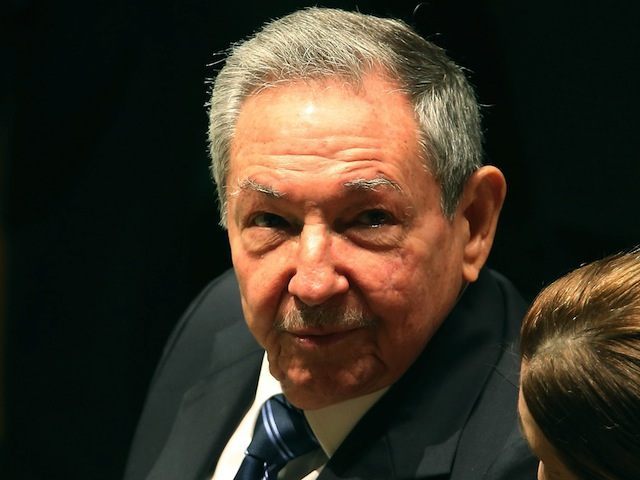Cuban leader Raúl Castro denied the existence of political prisoners when questioned by a U.S. reporter during a joint news conference with President Barack Obama on Monday, hours after the mass arrests of peacefully protesting political dissidents.
“What political prisoners? Give me a name, or names, or after this meeting is over you can give me a list of political prisoners and if we have those political prisoners they will be released before tonight ends,” replied the Cuban president to a question from CNN’s Jim Acosta, a second-generation Cuban-American.
Castro’s statements came after more than 50 pro-democracy dissidents were beaten and detained hours before President Obama landed in Havana to meet with Castro and other high-ranking members of his communist regime. The protesters were thrown into buses to be transferred into Cuban prisons to prevent them from disturbing activities linked to the U.S. president’s official visit.
In response to Castro’s comments, several reporters have taken to social media to post the lists that some international and Cuban human rights groups have compiled, naming the imprisoned political prisoners in the island nation.
“On March 19, the Victims of Communism Memorial Foundation released a list of 51 ‘prisoners of conscience,’ some of whom they say have been jailed for over two decades for questioning or speaking out against the Cuban government,” reports TIME. “The list of all 51 names is published in full on their blog.”
Marion Smith, the foundation’s chief, told TIME that Castro’s statements on political prisoners were “laughable,” adding that there may be a “couple hundred” political prisoners, even if his organization has only named 51.
“Nobody seriously things that there are not political prisoners in Cuba,” he said. “Just laughable that Raul Castro will ask for a list. There are many lists being circulated.”
The Foundation for Human Rights in Cuba has also publicized a list of 51 political prisoners in Cuba.
Shortly after Castro made the comments denying the existence of political prisoners, Fox News Latino reported that the Cuban American National Foundation (CANF) released a list of 47 political prisoners.
CANF was described by the news outlet as “one of the most influential Cuban exile lobby groups in the world.”
In a statement, the group said, CANF, said:
As requested today by Cuban President, Raul Castro, the Cuban American National Foundation provides a list of 47 verified political prisoners. It is our expectation that these political prisoners will be released, unconditionally, by this evening.
Reuters reported in July that the Cuban Commission of Human Rights and National Reconciliation, had accused the Castro regime of holding 60 prisoners even after the reported release of 53.
“The Human Rights Watch 2014 world report shows although the Cuban government has taken steps to reduce the number of long-term detentions and has released some prisoners, the regime still conducts arbitrary detention, public acts of shaming and deploys a range of tactics to punish political dissenters,” notes TIME. “Smith said dissidents often experience a cycle of ‘arrest, arbitrary imprisonment, release’ and harassment.”
Obama and Castro clashed on the issue of human rights for the Cuban people.
Responding to question from CNN’s Acosta about the state of human rights in Cuba, the President said, “I’ve met with people who have been subject to arbitrary detention and that’s something that I generally have to speak on because I hear from them directly and I know what it means for them.”
There was also signs of disagreement between the two leaders in the area of progress related to the U.S.-Cuban relationship.
President Obama began the press briefing by highlighting a “new day” in the relationship between the two former foes. The U.S. leaders’ visit marks the first trip by a sitting U.S. president in 90 years.
“For more than half a century, the sight of a U.S. president here in Havana would have been unimaginable. But this is a new day,” Obama told reporters, speaking from the presidential palace in Cuba.
Meanwhile, Castro said Cuba and the United States have achieved “good results” since the bilateral relations were reestablished by the Obama administration, but added that that the “positive” steps that have been taken remain “insufficient” due to the continuation of sanctions that would require an act of the American Congress to remove.
Castro also urged the United States to return of the territory occupied by the U.S. military at Guantánamo Bay, which he said is “illegally occupied.”
In December 2014, Cuba and the United States reestablished a bilateral relationship, after more than five decades of strained relations.
President Obama has embarked on a two-day trip to Cuba.

COMMENTS
Please let us know if you're having issues with commenting.